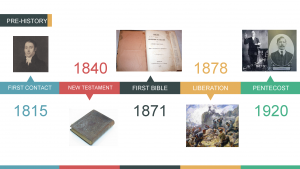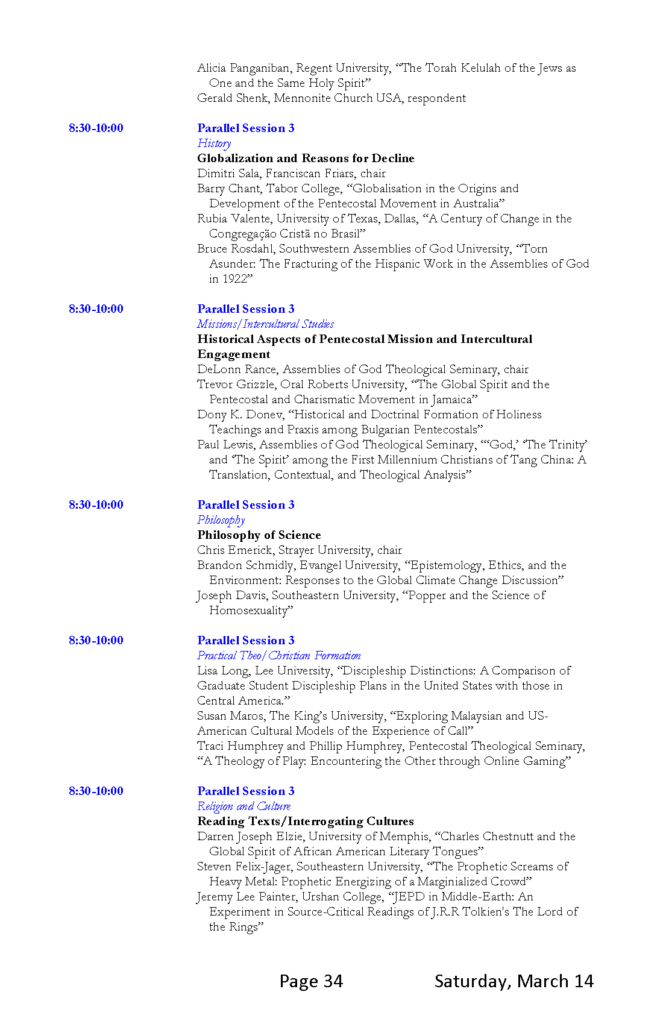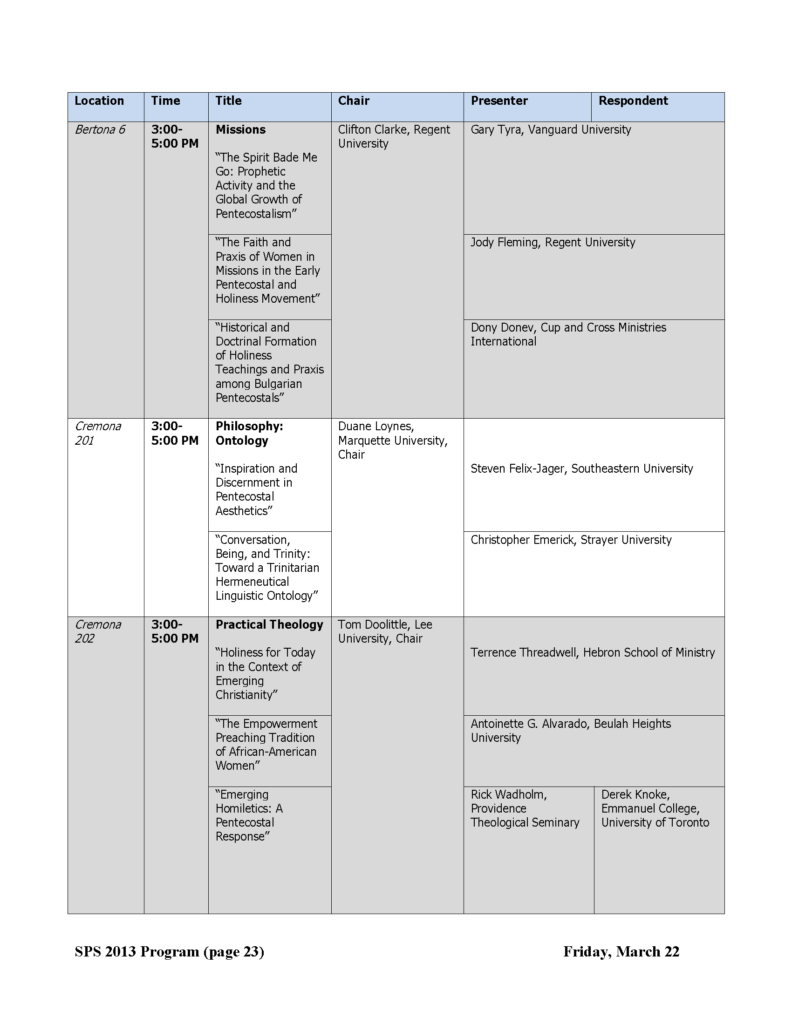Pentecostal Praxis
My first personal experience of the Pentecostal praxis was through the sacrament of the Lord’s Supper. It took place the day after I was saved, and ever since has taken a central place in my personal life, spiritual life and ministry. The liturgy I am about to describe is a typical Communion Service in the Bulgarian Church of God. It dates back to the early 1920s when Russian immigrants to the United States were traveling back from the Azusa Street revival to Russia to preach the Good News to their people. On the way back, their ship stops for a night at the Bulgarian port of Bourgas on the Black Sea. They attended the service at the Congregational church in town, and a great number of the believers received the Spirit through their ministry. This event is considered the initiation of the Pentecostal movement in Bulgaria.
The Church of God in Bulgaria was established in the 1928 with an identical name, but independently from the Church of God (Cleveland, TN). The first link between the two churches was established in 1985. During this 65-year period, the Church of God in Bulgaria was persecuted by Orthodox and nationalistic organizations before and during the Communism Regime, and was looked upon as an extreme cult organization. Yet, during these years of underground worship, the Church of God has preserved the liturgy of the Eucharist in the grade of authenticity in which it was received.
An essential part the service is the preparation. The believers depend on the leadership of the Holy Spirit for the exact date and time of the Communion Service. Due to the lack of scheduled services in the underground church, the believers trusted in the protection of the Holy Spirit in arranging the service. Fasting is also a requirement on the day of the service.
The actual service usually takes place in the nighttime when everyone is free from work. It takes place in a believer’s home. Sometimes these services have up to fifty people in a small apartment. Worship is quiet, because any loud noise may lead to the appearance of the police.
The physical silence, however, does not limit the presence of the Holy Spirit, and even helps the believers to be more sensitive to God’s voice, which is indescribable when taking place as a group experience. The service starts with prayer, which lasts till God reveals who among the ladies is to beak the unleavened bread for the communion. After the chosen ladies leave to bake the bread, the minister delivers his communion message.
The altar call, given after the preaching, purposes to prepare the believers for Communion. Communion is not given to a person who is not saved, baptized in water and in the Holy Spirit. Therefore, after the sermon, a prayer is offered for the sick and the needy, a special prayer is prayed for repentance and the baptism of the Holy Spirit. I have personally witnessed up to thirty people saved and baptized in the Holy Spirit in a matter of minutes.
The converts are led to the river and baptized in water. This is often done in the middle of the night, when sometimes the temperature is so low that the minister and his assistants break the ice in order to baptize the convert.
The converts are welcomed back with a special song sung by the congregation. After an extended time of self-examination and the request of each believer to be forgiven by the present members of the congregation, the pastor presents the Communion to the congregation. One unleavened cake is used as a symbol of the oneness of Christ’s body. The cup of the Communion is filled with wine. The roots of this tradition can be traced back to the teachings of the first western missionaries to Bulgaria at the end of the nineteenth century, as well as the influence of the Eastern Orthodox tradition. After communion, men and women are separated for a foot washing service. At the end of the service, all are gathered for an Agape feast, which serves as a conclusion of the Communion Service.
This communion liturgy has been strictly preserved for the past hundred years by believers who have been challenged to keep their faith even with the cost of their lives through the persecution of Communism. Apart from the official doctrinal teachings of the denomination, the experience of the sacrament has been its only protector.
It would have been easier to define and reconstruct the basic list of church practices if at least a minimal structural system, formal government or doctrinal statements existed. Both the Primitive Church and Early Pentecostalism substantively lacks all of this. It was this deficit that creatively shaped the identity of the Church and presupposed its further search for primitivism.
Although the primitive communities were not the same everywhere, three practices were common for all: sharing of possessions, baptism, and communion. They were accompanied by the early liturgical formulas such as amen, hallelujah, maranatha, etc.
The message of the Primitive Church was delivered mainly through speeches (Acts 2, 7, 17, 20, etc.) and communal discussions of examples of the Bible (Acts 7; Heb. 11). It contrasted the present experience with the former lost conditions in a before-after contextual method (Rom. 7-8) and served as a practical instruction of the Christian walk (Col. 3:5ff.).
Historical and Doctrinal Formation of Holiness Teachings and Praxis among Bulgarian Pentecostals
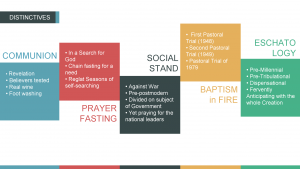 Research presentation prepared for the Society of Pentecostal Studies, Seattle, 2013 – Lakeland, 2015, thesis in partial fulfillment of the degree of D. Phil., Trinity College
Research presentation prepared for the Society of Pentecostal Studies, Seattle, 2013 – Lakeland, 2015, thesis in partial fulfillment of the degree of D. Phil., Trinity College
In conclusion, it must be noted that like many other places around the world, Bulgarian Pentecostalism began and continues to be in the periphery of both social and religious life. The movement has been persecuted as new, extreme, outcast and even satanic, but in the end Pentecostalism prevailed from the periphery. The only problem with holding strong in the periphery of society is that you spend all your money, all your time, all your motivation, everything you have to change the center – to change reality itself. It demands an extreme internal passion to continue and to become a movement of social influence. For the external observer this makes no sense. The time and resources spent could be so much helpful somewhere else. Perhaps, in an environment that is more suitable for the center – more controlled by the center. And an environment that does not make the center look bad.
But when this environment is not the center itself, then the periphery becomes a public enemy to the centralized society and is discarded as crazy, obscene and even inhumane. To the point that after giving it all, you start to feel like it was all spent for nothing.
Then you get back to the mission that is more important than our feelings or emotions and convince yourself with all you have left, that the end result is worthy. And then one day you wake up in the center of reality. Even more, you become the center of reality.
And the question remaining is how to balance the center with the periphery. If we were always in the center of culture, religion and economics, we would have never heard the voice of the God of the periphery. The God of the enslaved, oppressed, persecuted, poor, sick and suffering – God of the miraculous…
Historical and Doctrinal Formation of Holiness Teachings and Praxis among Bulgarian Pentecostals
by Dony K. Donev, D.Min.
Historical and Doctrinal Formation of Holiness Teachings and Praxis among Bulgarian Pentecostals (Research presentation prepared for the Society of Pentecostal Studies, Seattle, 2013 – Lakeland, 2015, thesis in partial fulfillment of the degree of D. Phil., Trinity College)
Protestant work in Bulgaria began in 1815 when agents of British and Foreign Bible Society, Robert Pinkerton (1780-1859) and Benjamin Barker (d.1859), initiated a search for Bible translators in the spoken Bulgarian vernacular. As a result a new translation of the New Testament in Bulgaria was published in 1840 and the whole Bible in 1871.
By the liberation of Bulgaria from Turkish Yoke in 1878 Protestantism was well established in Bulgaria. Graduates from Protestant Robert’s College became prominent politicians in the new Bulgarian state. When the first Pentecostal missionaries arrived in 1920, they found a century old protestant tradition in Bulgaria.
Presenting at the Society for Pentecostal Studies in Southeastern University on “Historical and Doctrinal Formation of Holiness Teachings and Praxis among Bulgarian Pentecostals” (Part 2)
January 25, 2015 by Cup&Cross
Filed under News, Publication, Research
Presenting at the Society for Pentecostal Studies in Southeastern University on “Historical and Doctrinal Formation of Holiness Teachings and Praxis among Bulgarian Pentecostals” (Part 2)
Presenting at the Society for Pentecostal Studies in Seattle Pacific University on “Historical and Doctrinal Formation of Holiness Teachings and Praxis among Bulgarian Pentecostals” (Part 1)
March 10, 2013 by Cup&Cross
Filed under News, Publication, Research
Presenting at the Society for Pentecostal Studies in Seattle on “Historical and Doctrinal Formation of Holiness Teachings and Praxis among Bulgarian Pentecostals” (Part 1)
Religious Praxis without Religious Identity
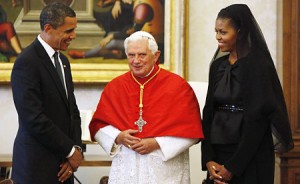 Some people who do not identify with a religion, nevertheless, practice some form of religion
Some people who do not identify with a religion, nevertheless, practice some form of religion
Sizable numbers of those who do not affiliate psychologically with any religion are, nevertheless, occasional or unsettled practitioners. As such, they might sometimes attend religious services, have previously identified religiously as adults, or expect to take up a religion sometime in the future. A more complete religious profiling requires additional information about religious beliefs and behavior.
Gallup Polls, which use a differently worded question emphasizing “religious preference,” seem to indicate less change over the same time period as well as a lower current proportion of “no religion” / “none” responses. Unfortunately, Gallup changed the question wording several times, complicating analysis. Since mid-2000, they included the “if any” phrasing in their primary version of the question: “What, if any, is your religious preference — Protestant, Roman Catholic, Jewish, Mormon, Muslim, or an Orthodox religion such as Greek or Russian Orthodox?”
This study is an excerpt from the larger report on The Decline of Religious Identity in the United States by Sid Groeneman & Gary Tobin published in 2004 via the Institute for Jewish & Community Research (http://jewishresearch.or)


